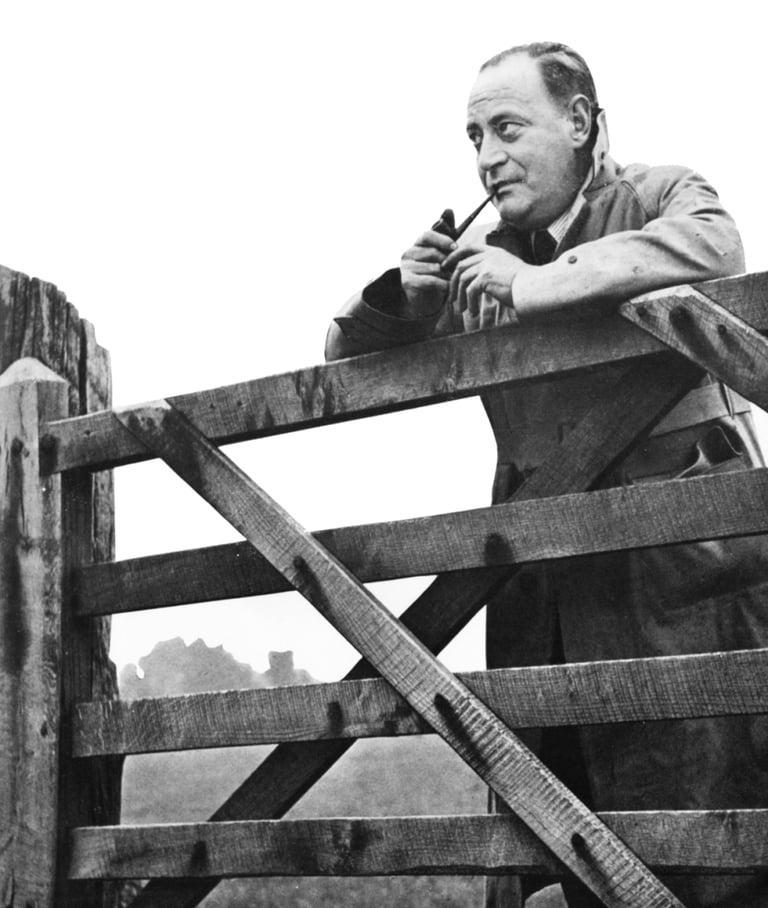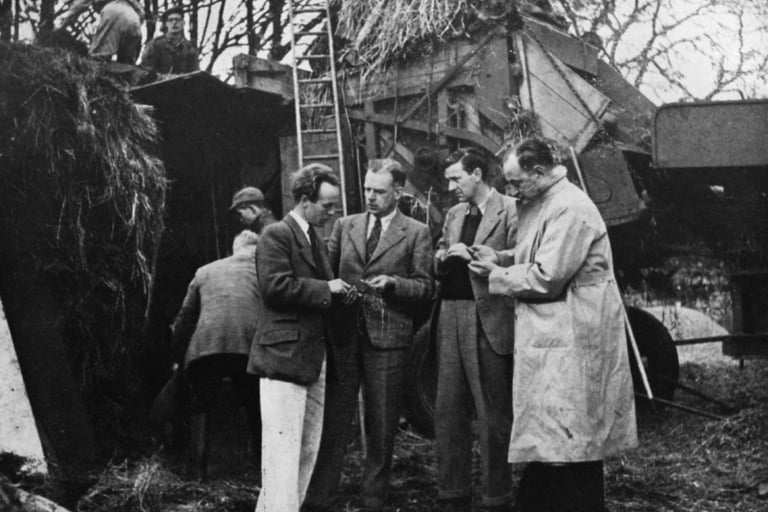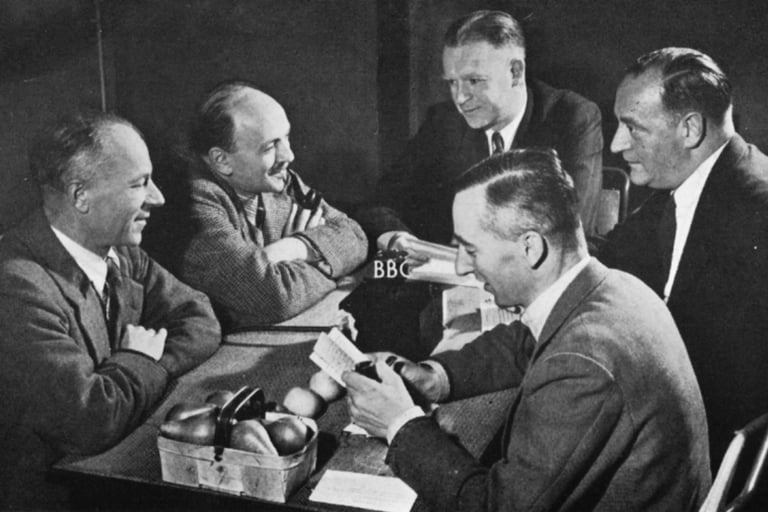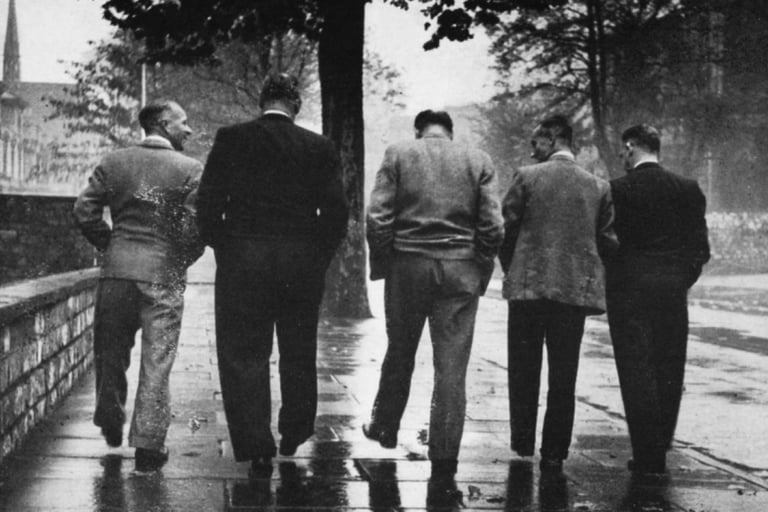Ralph Wightman: the voice of Dorset
DORSET, ENGLAND
10/2/20237 min read


Deep Dorset in his voice – the rhythms of the countryside in his thoughts. Ralph Wightman (1901-1971)
If the Stephenson family from my novels were gathered around the radio, fellow Dorset native Ralph Wightman would have been a familiar voice. He's the well-known BBC broadcaster you have probably never heard of, but to British readers (and radio listeners), his list of regular radio gigs will sound very familiar: Any Questions, Country Questions, Desert Island Discs. So ubiquitous was his voice that he was sent up by the incomparable Kenneth Williams in the radio show Beyond Our Ken, in the character of farmer Arthur Fallowfield. In addition, he wrote columns for national newspapers such as the Guardian and News of the World, and over a dozen books on countryside themes.


I’m heavily indebted to Wightman for giving me the tone and details I wanted for my novel A Dorset Lammas: the educated, thoughtful Dorset farmer, just as capable of being the tough modernist of the farming world as the champion of its best traditions. He perfectly encapsulated what I wanted to convey through the landowning Stephensons. From a turn of phrase, a detail of a hedgerow, a paraphrase of an opinion on farming, to a portrait of a shepherd, he helped to bring my world to life. Here he is, commenting on the ‘modern’ milking shed:
Grandfather thought that animals were used to the light of the moon at night and that any greater illumination would be terrifying. He was utterly wrong but that will never stop any modern crank from pointing to grandfather as a pillar of wisdom.
My feeling is that grandfather was just about as much right and just about as much wrong as I shall seem to my great-nephews… He was utterly wrong in thinking that the cows and the sheep would be frightened of a bright light. We may be equally wrong in insisting on a cold cleanliness in the milking shed which must be uncomfortable for the cow. Grandfather made the cow warm and happy in deep beds of straw, and it was rendered even warmer by the dung which was mixed with it. My generation think only in terms of producing milk which is free from any danger of bacterial taint. We copy the hospital ward whereas great-grandfather thought in terms of the four-poster bed with a feathered mattress and heavy hangings to keep out any draught. (The Seasons, p. 52)


Getting ready for Country Questions: Wightman is on the far right.
Wightman came from a Dorset farming family in Piddletrenthide. He won a place at Beaminster Grammar school, and from there went on to study agricultural chemistry. Although full-time farming was not for him (partly to a heart condition, which he thinks may have been misdiagnosed), he was still deeply committed to agriculture and his home county. Through lecturing and county council jobs, including a few local broadcasts, he met another famous West Country voice, Arthur G. Street, who boosted Wightman’s broadcasting career when he asked him to stand in for a national broadcast on the Bristol Royal County Show. What should have been a forgettable news report was transformed into 'superb story because a great gale swept up the Channel and blew half the show down. Of the poultry marquee nothing remained except one tent pole with a rooster sitting on the top' (Take Life Easy, p. 115).
During the Second World War, Wightman gave a weekly broadcast on English country matters to the United States, apparently clocking up nearly 300 episodes, rivalling the more famous Alastair Cooke's Letter from America. At home, he worked for the BBC Home Service programme Country Magazine – a precursor of sorts to today’s very popular TV programme Country File. Being a scripted programme, Country Magazine had to go through the censors before being broadcast. It was only later Wightman learned that some of the changes made by censors were actually code instructions for the Resistance in Europe!
He also became a regular on Any Questions, which began in 1948 and is still going strong, as well as on its sister programme, Country Questions, which ran until 1966, with Wightman as a fixture on the team. Apparently, Wightman only missed being on the first broadcast of Any Questions because of a lecturing engagement. It surprised me that although fellow panelists that he mentions in his autobiography are familiar names to me (e.g. Quintin Hogg and Jeremy Thorpe), his is not, nor does it ring a bell with others I talk to. I can only supposed this is because he passed away in the early 70s, which puts him beyond the memory of anyone around my age.
Shortly after the war, the Ministry of Agriculture decided to reorganise its activities, which would have forced Wightman to become a civil servant. This also meant he would have had to turn over any broadcasting earnings to the Ministry. Since his 'sideline' now earned him more than his regular job, he opted to leave (actually, he told the interview committee for the new post that he would be paying them to employ him, and then refused to resign, biding for time until they were forced to sack him). He claimed not to be unduly nervous of freelancing: 'No one who spends all his early years in the atmosphere of a farm, or of a small retail business, is excessively scared of facing life without a monthly salary, or unemployment benefit' (Take Life Easy, p. 141). From then on, he devoted his time to writing and broadcasting about the West Country, working up to his untimely death from a fall at his home in 1971. Just a few years earlier, he had concluded his 1968 biography with the reflection, 'Probably a foreseen future, with safeguards, is wholly admirable; as old age approaches, I wonder if this is true. Yet I still feel glad that I took life easy' (Take Life Easy, p. 156) I'm glad his philosophy turned out to be correct.
I stumbled upon Wightman by happy accident, browsing the second-hand local history section in The Swanage Bookshop. I picked up Portrait of Dorset (this was part of a multi-author series and there seem to be lots of copies floating around). His voice and insights immediately captured me, for their own sake as well as for my novel’s, and I began to investigate further. Imagine my feeling of serendipity when I got a copy of The Seasons, musings on Dorset country life through the year and published in 1953, the very year A Dorset Lammas is set!


Off for a beer after broadcasting: Wightman is second from the left
A philosopher farmer, his versatility as a writer is obvious, whether he is recreating a country cricket match, laying out the practical economics of food production, or drawing a comic portrait of the farmer waiting up at night for Dairymaid to deliver her calf. To read The Seasons is like sitting in front of a man with a very large beer in his hand, listening to him wax lyrical and wide on the Dorset countryside, past and present, good and bad.
Leaning on the gate, on this first evening of autumn, memories of the year come back, misty already and blurred by recollections of forty years of seasons. There was evening bird song in spring which is pleasanter than the dawn chorus because it is a little sleepy and speaks of rest rather than of the urgency of the morning. Then there was mid-summer noon with the scent of honeysuckle and the sound of the undertone of insect wings, and winter with snuffling, curious heifers in the snow with their breath going up like steam. There was a red sun and a silver moon in the sky together. All these I have loved. Now at the end of the summer comes the drip of the rain from the untidy hedges, the wood of the gate, rather slimy, marks the elbows with green. Another year has flamed and faded. The shape of the land has not altered for a hundred thousand harvest nor for ten thousand generations of men. A hedge has been put in here, the turf has altered there. The ox plough turned out the breast plough, the horse replaced the ox, the giant steam engines came and now there are smooth tractors as comfortable as motor cars. This year is past its prime, but next spring the field will grow young again. This gate will be replaced, and I shall be replaced, but sun, rain, snow and tempest in their seasons, will praise the Lord who made these little hills. (The Seasons, pp. 166-167)
Sources: I think all of his books are out of print now. Among those I’ve found to be still available on second-hand sites are The Seasons, Portrait of Dorset (as mentioned, part of a series by various authors on the British Isles), Take Life Easy (his autobiography), My Homeward Road, Watching the Certain Things (based on a Devon-London railway journey), The Countryside Today, Wallace’s Ground (on changes in farming and country life), Days on the Farm, and Abiding Things. If you want to see him in person, here’s a brief Ministry of Information film where Wightman advertises for more farm workers during World War II.
There’s a succinct biography of Wightman on the Dorset Ancestors website, and a more general one bout the BBC West Broadcasting Service that features him (photo credits are for this site).
